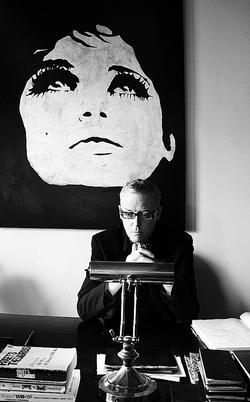 |
PHOTO BY TIMOTHY WILLIAMS |
Some cultural genealogies are not really linear — they're more like tangled networks. You can draw lines from goth to industrial back to punk and then back again to situationism and surrealism. You can draw other lines that go back to German expressionism, or glam, or symbolist occultism. From Bauhaus (the band) to Bela Lugosi to Murnau to Bauhaus (the design movement).
David J, the least flashy member of Bauhaus and Love and Rockets and their quiet intellectual, has been tangled up in that network for decades now. (He's the one who wrote the lyrics of "Bela Lugosi's Dead" and the one who's long been chummy with comics genius/magick practitioner Alan Moore.)
His interests are not narrow but there's a recursiveness to them: In conversation he jumps easily from Aleister Crowley to Joe Orton to Bowie and Kurt Weill and Murnau and the Sex Pistols and Joy Division. If it's dark and uncanny and smells a little of old Berlin and opium, our man David J is on it.
"I'm now writing screenplays," he tells us in his Hollywood apartment. David J lives, as you'd imagine, in perfect bohemian style, in an old-Hollywood apartment from the Hollywood Babylon era, haunted by the memories of former residents including Weill, George Cukor and Louella Parsons. Weimar exile, gay decadent, tawdry gossip: As we said, the man even chooses his ghostly neighbors with care.
David and his writing partner, Don C. Tyler, are working on a script based on his stage play about Crowley (like the initiated, he pronounces it "CROW-ly"). "The idea behind that was Crowley as seen through the eyes of his Scarlet Women, who are his partners in his rituals," he explains.
Like many a Hollywood denizen, he's currently "taking meetings," except most Hollywood denizens are not foundational figures of an entire subculture, instantly respected by the producers of Shadow of the Vampire (Murnau, again) and Control.
Given his interests, it should come as no surprise that David J's stay in Los Angeles involves a preoccupation with our own local black hole of murder, dismemberment, conspiracy, fame, corruption and even well-known European surrealism in exile: the Black Dahlia murder.
"A couple of years ago," David explains, "I was approached by an independent film director, Ramzi Abed. He wanted me to write some new music for a film that he was doing about the Black Dahlia. It was a very sort of surreal, really left-of-field take on it. It was very dreamlike and possibly about the reincarnation of the Black Dahlia. Not really ... a commercial film." David shows us the gaudy 2007 DVD of the movie The Devil's Muse, with garish lettering declaring it "Intoxicating and Sensual (Rue Morgue Magazine)" and proclaiming "HOLLYWOOD MURDERS WOMEN."
"That film was the catalyst for me to meet my writing partner for the project, Ego Plum, and he's a great musician, a great arranger. We collaborated on some of the songs, some of it I did myself, and we collaborated on this song cycle about the Black Dahlia. I didn't even watch the film when I was writing. It was a catalyst for me to write the songs and to immerse myself in the legend of the Black Dahlia and I became a bit ... obsessed."
Like his friend Alan Moore, David describes the creative process in supernatural terms. "I felt that some of what I was getting was somehow received from somewhere," he continues, "like I was a channel for it and it was flowing through me. It was quite strange, the whole process, and a little bit unsettling, I must say. But anyway, I ended up with this song cycle, and I always thought this film is not the end of this. I want to do something else with this in the future — these songs are very potent."
While the Black Dahlia song cycle languished in obscurity as a bonus CD given away with the Devil's Muse DVD, David moved on to work on a stage performance based on the figure of Andy Warhol superstar Edie Sedgwick. "Helene Federici does something called electropera, combining electronic music and opera. I did a play in 2008 called Silver for Gold: The Odyssey of Edie Sedgwick," David says, pointing at the huge portrait of Edie hanging over his desk. "We had a two-week run in a little theater in East Hollywood here, the Met Theatre. After that we were included in and event called Night Gallery curated by artist Timothy Williams one night downtown at the Regent Theater where we had a band playing the music and also Velvet Underground songs, we did 'Black Angel's Death Song.' Night Gallery had an art show, a light show, cemetery installation, DJ's — it was quite a scene. It was totally packed and a great crowd."
After Silver for Gold, Federici told David she wanted to put on a new opera and invited him to do "whatever I wanted, something theatrical." What happened next, again, was magickal:
"I went to bed without knowing what I was going to do. I suddenly woke up at 3 in the morning and I went, 'I know what I'm gonna do! I'm gonna revive the Black Dahlia song cycle!' But I knew I needed to write something around the songs, something dramatic. And I didn't know what it was going to be until ... that morning I opened my computer and I had an email from a musician who played cello on my first piece [a performance about the murder of playwright Joe Orton by his lover] and I hadn't seen her in a long time. Just out of the blue I had an email and it was referring me to a newspaper article and it said, 'Whittier woman connected to Black Dahlia murder.' So synchronistic, you know.
"So I looked at the article," David continues, "and it was fascinating because it was about this torch singer, Madi Comfort. She appeared in the film-noir Kiss Me Deadly, she's in the nightclub scene. She sings this song, 'I'd Rather Have the Blues Than What I Got,' and she also sang with Duke Ellington and Frank Sinatra. Duke Ellington wrote Satin Doll about her and for her."
The 2010 article claimed that Comfort, who died in 2003 and who belonged to one of the first black families in Whittier, had a connection with the Black Dahlia: She was a girlfriend of George Hodel, the mysterious Hollywood STD doctor (and friend of surrealist Man Ray) identified as one of the prime suspects in the crime. "She was the last woman to be seen with him before he left the country and she was interrogated by the police about her connection with him. According to the article, on her deathbed she made this revelation that she always knew that George Hodel was the murderer. She had this dark secret she had to get off her chest. And I thought, 'This is it! This is like gold for me. I'm gonna take this — this is the dramatic element.' "
David then refashioned his 2008 song cycle into a musical play, The Chanteuse and the Devil's Muse, which was supposed to premiere at the Million Dollar Theater downtown this week, before permit and production issues forced a rescheduling to later this year.
"The scenes in the play are Madi's police interrogation by this guy, the cop. There's maybe two lines on record from the actual interrogation, but I let my mind go with it and I just imagined what the actual interrogation was. And also wrote it in such a way that each section would lead into one of the songs. When the songs were originally written I didn't even know about Madi."
His approach was enormously influenced by Moore, who famously tackled a similar subject (the Jack the Ripper murders) in his epic comic book tour-de-force From Hell. "Alan is always there, like, in the back of my head," David says, "exerting an influence as to the integrity of the writing and how you can use your imagination and just go to places that are so unexpected and interesting and it becomes a psychic investigation of the subject."
This mediumistic approach allowed David to venture a solution to the Black Dahlia mystery. "In my play, Madi does make a revelation that it was Hodel, but also that he had an accomplice, and who it is, that's my own revelation and I don't wanna give that away because it's a real twist in the ending. The cop is interrogating her and she goes into a heightened reality and walks toward the front of the stage and she talks about appearing in Kiss Me Deadly years later and how she sang 'I'd Rather Have the Blues Than What I Got.' Those lyrics take on a different meaning."
"There's a really wonderful butoh performer, Vangeline, and she plays the ghost of Elizabeth Short, newly dead. And she's dead but she doesn't realize it." The Poubelle Twins, from the Velvet Hammer burlesque troupe, portray Short's disembodied head, torso and limbs.
"I noticed there's quite a lot of German-style cabaret things. So many things aligned with burlesque going on around town," David says, bringing his very Los Angeles noir all back to Weimar, home of the original Bauhaus. "It's an interesting point of reference. There's a certain decadence to L.A., and in the current political/financial climate I think you can draw comparisons to a degree to Weimar, before the war. And that creates this particular kind of art that's flying in the face of that, but also referring to it, and it's sort of rhapsodizing the decadence as well as being critical of the political climate. Especially with the way the financial situation is, the parallels are kind of interesting."
Silver for Gold: The Odyssey of Edie Sedgwick will be revived in an expanded version at REDCAT in September. The Chanteuse and the Devil's Muse is scheduled to premiere Nov. 12 at the Million Dollar Theater.
